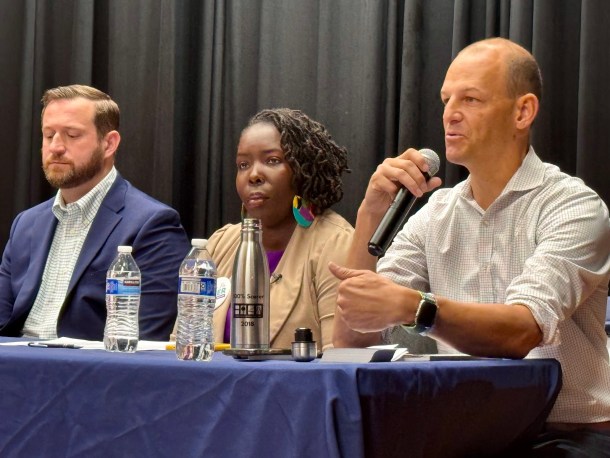By Robert J. Hansen | OBSERVER Staff Writer

The Greater Sacramento NAACP held a mayoral candidates town hall and straw poll in Oak Park on Nov. 11.
Dr. Flojaune Cofer, former City Councilperson Steve Hansen and Assemblyman Kevin McCarty responded to questions about homelessness, police reform, and interagency coordination and cooperation. Former state Sen. Dr. Richard Pan provided an introductory speech via Zoom but could not attend.
Hansen said Sacramento has to get back to evidence-based solutions. He said the system is fragmented and that lost in the shuffle are the most vulnerable people on our streets.
“We’ve poured tens of millions of dollars and gotten worse and worse outcomes,” Hansen said. “We can do better housing them and providing wraparound services and getting them back on their feet with things that give them dignity again.”
McCarty said the city needs to clear sidewalks so that kids can walk home from school and not have to walk in the street, but that the unhoused also need to be told where they can go, not just where they can’t.
“Everywhere I go people are saying, ‘Why can’t we solve this?’ We are all in this together. The city can’t solve it,” McCarty said. “It’s got to be the county, the federal, the state, it’s going be community partners like the NAACP. We need to look for solutions focusing on the urgency today. Too often we focus on all the other things and hope this issue just goes away. We need to focus on permanent, supportive housing but triage the emergency today and help get people off the streets.”
Dr. Cofer, who won the straw poll of about 100 participants, said in her first hundred days as mayor she would set priorities on homelessness.
“We need safe ground,” she said. “We need places where people can go immediately so they can have bathrooms where they can have showers and do laundry, somewhere to charge their cell phones and a safe place to sleep. We cannot continue to tell people where they cannot be until we tell them where they can be. We also need a plan to keep people in their homes.”

Dr. Cofer said that as a public health professional, she has worked on addressing disparities her entire career.
“If your only solution to every problem is a hammer, then every problem starts to look like a nail. We keep trying to criminalize our way out of other issues that we have a responsibility to take care of,” she said. “I’m concerned that we are shoveling all of our unhoused neighbors into our jails.”
She said a disproportionate number of people in jail are Black. “When we use our criminal justice system as a tool, we disproportionately harm Black people,” Dr. Cofer said. “I want us to use our money in ways that don’t cut our noses to spite our faces.”
McCarty said criminal justice reform has been the body of his work while in the state Legislature.
“Dr. Shirley Weber and I led in and wrote the use-of-force bill after the great tragedy we saw in South Sacramento where Stephon Clark lost his life. It’s not just some platform for me running for mayor in 2023-24, it’s my work from the past decade,” McCarty said. “I wrote the law to reform our sheriff oversight committee when the sheriff here locked the door on oversight. I worked to make sure that our attorney general could do independent police investigations for officer-involved shootings.”
He said his focus is on successfully reintegrating people into society from the justice system and working to make sure they have the right to vote after incarceration, the revocation of which for convicted felons is a relic of Jim Crow.
“It’s the work that I’ve done for the last 10 years,” McCarty said. “You determine your future by your past. As mayor, I will lean in on police accountability. Not all police officers cross the line but when they do, they’ll be held accountable.”
Hansen said communities of color have suffered from historic discrimination and systemic bias that has deprived people of some of the economic and social opportunities others take for granted.
“When we talk about this it’s twofold: We have the job of protecting the people in our neighborhoods and the people who are working in businesses from violence and crime,” Hansen said. “That’s only a piece of it though. We’ve got to get upstream and invest in our communities through partnerships. I think, as we look at the future of the city, those [partnerships] are preventative to an extent, but if we don’t create economic opportunity by really creating more housing [and reducing] the barriers to entrepreneurship … if we want to reduce community violence, it’s going to have to be all of the above strategies.”
Dr. Cofer noted that police reform has become such an issue in Sacramento that the city in recent years has made budgetary allocations for paying settlements in cases of alleged police misconduct. “We need to start having an honest conversation because we have an Office of Public Safety Accountability and inspector general, we have a police review commission, and quite frankly our police department has not played nice with any of them.”
She noted that Dr. LaTesha Watson, Sacramento’s Office of Public Safety director, is a former police chief and that if the police department can’t work with a former chief, the problem is the department.
“Our police department is not working well with the people that they should be,” Dr. Cofer said. “What I’m talking about is budget realignment and role adjustment. What I’m talking about is creating a city where we do things that work and keep us safe,” Dr. Cofer said.
Hansen said the city’s lack of progress on police reform also reflects many of the challenges faced by the county and state.
“The city has tried to be at the forefront. When I worked on the Council … that’s where the use-of-force policy reforms came from,” Hansen said. “That’s where some of the other things related to body-worn cameras came from.”
He said the city needs to use evidence-based interventions regarding police reform and find opportunities to shift some of law enforcement’s responsibilities. He said that as mayor he will seek to “refocus the department” and see that such calls are redirected to agencies other than law enforcement.
McCarty said that if elected, he will lean in on police reform. “Do you think that if all the public knew how much we pay out in police settlements that they would be OK with what we’re doing? No,” he said.
“I think we can fund our police department and have accountability. I think that officers generally do a good job, but when they cross the line there needs to be accountability.”

McCarty said addressing issues such as homelessness and housing requires cooperation among city, county and state entities.
“All jurisdictions are in this together,” he said. “I don’t think that pointing fingers and bringing lawsuits against other jurisdictions are going to solve problems.”
McCarty pointed out that he secured $25 million in state funds on a $10 million ask from the county to get people off the American River Parkway, but that after 17 months, the county has spent none of that money.
“That means it’s not always money,” McCarty said, but instead sometimes a case of leadership failing to act with urgency.
Dr. Cofer echoed that sentiment and questioned how people are living on the streets in the capital of a state with the world’s fifth largest economy.
“I’m frustrated because we often hear about all the things that have been done, but yet anybody who has been in elected leadership for the last 10 years has overseen the growth and homelessness from 2,500 hundred people in 2013 to 10,000 people,” Dr. Cofer said. “This is not rocket science.”
She said there has been a lot of talk about what could be done and what should be done, but not a lot of action.
“I’m running because we need actual answers to the challenges facing the community we all live in and love,” Dr. Cofer said.
Hansen said people are tired of government infighting. He credited the county for having “turned the corner” on addressing homelessness, specifically for its recent opening of a village of tiny homes. “And that is their job under this structure of government,” he said. “They have human services, public services and public health; that’s what tax dollars go to them for.”
“Before I got elected, we didn’t have one staff person with the city whose job was to coordinate with the nonprofit community, with the health care community, with the county, with the school districts on this very issue. … We just have to get back to doing our job and working together.”
The mayoral primary is March 5. If a candidate wins more than 50% of the vote in March, that person becomes mayor. Otherwise, the leading two candidates face off next November.
This post was originally published on this site be sure to check out more of their content.












